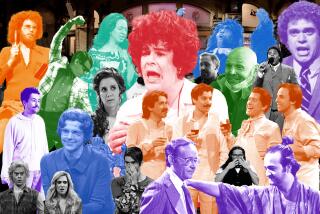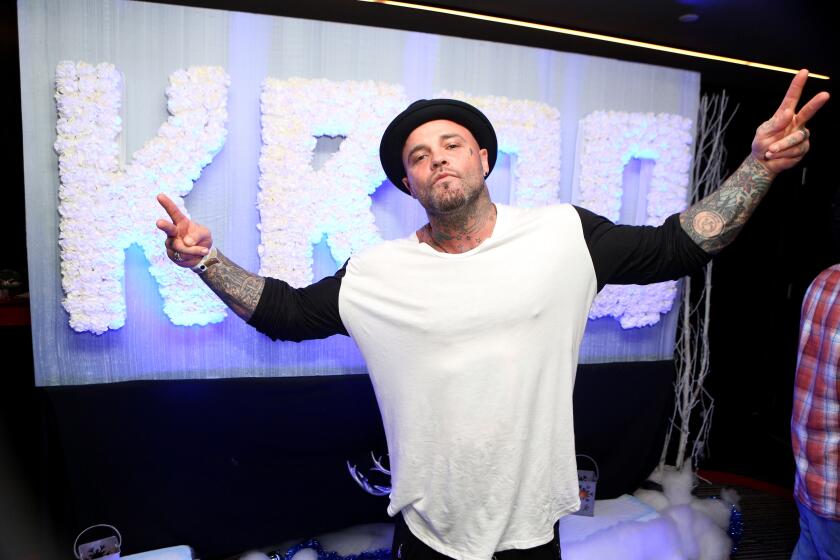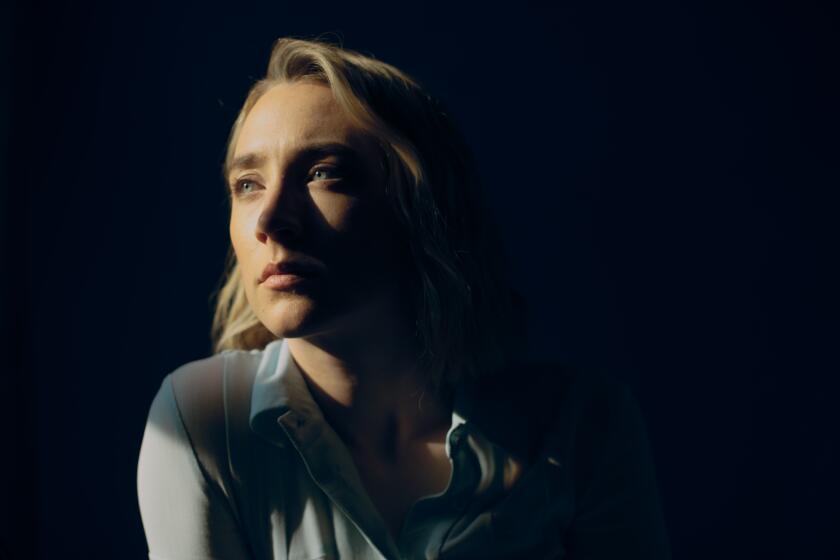His furious ‘Delirious’ days
Shirtless and dressed in red leather pants and matching jacket unzipped to his navel, Eddie Murphy sauntered onto the stage of Washington, D.C.’s, Constitution Hall one night in 1983 and changed the face of stand-up comedy forever.
At the time, Murphy was “Saturday Night Live’s” youngest cast member and a newly in-demand movie star after the success of his action comedy “48 Hrs.” Age 22 and cocky as a top gun pilot, Murphy used an arsenal of curse words that made his punch lines detonate with the force of sidewinder missiles. But his jokes were a revelation.
Captured by an HBO documentary film crew, Murphy’s performance galvanized a generation of comedians when it went into rotation on the cable channel the following year under the title “Eddie Murphy: Delirious.” And earlier this month, a 25th anniversary “Delirious” DVD reached retail. The disc serves to remind comedy lovers that Murphy wasn’t always the family-friendly star of such flicks as “The Nutty Professor II: The Klumps” or “Daddy Day Care” -- not to mention the ‘tween-skewing “Imagine That,” which opened Friday. Once upon a time, Eddie Murphy was a baaad man -- a stand-up superstar who could in equal parts infuriate, entertain and inspire his audience.
“ ‘Delirious’ put Eddie in a league by himself,” said comedian Robert Townsend, who directed Murphy’s second concert movie “Raw” and recently directed the documentary “Why We Laugh: Black Comedians on Black Comedy.” “He definitely took the art form and raised the bar. He set a tone. And the rest of the comedians had to step up their game.”
Over the course of his act, Murphy verbally flambes an eclectic array of subject matter, with spot-on impersonations of Elvis, Teddy Pendergrass, Stevie Wonder and Ricky Ricardo; reenactments of what Mr. T and “The Honeymooners’ ” Ralph Cramden and Ed Norton would have been like as outed gay men. And Murphy became perhaps the earliest comedian to riff on how Michael Jackson “ain’t the most masculine fellow in the world.” He made the ridiculous sublime while also managing to get laughs out of such once-sacrosanct subjects as AIDS, slavery, domestic violence and what he predicted would be the assassination attempt on America’s first black president.
Adhering to a long-held policy of not granting newspaper interviews, Murphy declined to comment for this story. But on the “Delirious” DVD, a Who’s Who of black comedians, including Chris Tucker, Cedric the Entertainer, Sinbad and Martin Lawrence, weighs in on the TV special’s initial impact.
“Eddie Murphy inspired me to become a comic,” Chris Rock says. “ ‘Delirious’ was a combination of two things: great material and a great performance. I had never seen anything like it.”
Adds Keenen Ivory Wayans: “That was a defining moment in comedy. That was when every other comedian raised their expectations.”
--
Talk about intensity
Murphy’s brother Charlie Murphy, a successful comedian in his own right, recalled Eddie’s intensive preparations in the lead-up to “Delirious.” Eddie had been honing his stand-up act on his “Lord Have Murphy” North American tour and was primed to deliver the maximum comedic payload that night at Constitution Hall.
“His show was real tight,” Charlie Murphy said. “The beats per minute. The rhythm of his show. It would be: one, two, three -- ba-boom! The one and two jokes had chuckles on them and three was the big laugh. So you had seamless laughter from beginning to end.”
Upon airing, though, “Delirious” generated no small share of controversy for the special’s profanity (which was considered excessive by the era’s abiding mores but hardly raises an eyebrow today in contrast with, say, a Katt Williams special). Moreover, critics decried Murphy’s gay jokes as homophobic, resulting in protest picket lines at his subsequent stand-up engagements.
“I never paid any of that stuff any mind,” Murphy says on the DVD. “It was part of it -- what I was doing. It came with it.”
No small part of Murphy’s impact in “Delirious” comes from what he is wearing: a tight-fitting red leather outfit the comedian picked up at a D.C.-area shopping mall on the day he shot the special. According to several comics, that wardrobe choice was nothing short of a watershed moment in comedy.
“Back then, the red leather suit was revolutionary,” Charlie Murphy said. “Most comedians dressed like bums. They looked unassuming and dressed down. The last thing you wanted to do was be pompous. Project a threat.”
“He came out as a rock star. Not the traditionally dressed, suited Bill Cosby. Eddie was wearing thousand dollar belts, diamond watches, open leather jackets with his chest out.”
--
‘Delirious’ disciples
“Delirious” became a generational touchstone. Arriving on HBO’s programming lineup at a time when cable television was still in its relative infancy, when the channel had only a scant amount of original content, “Delirious” aired morning, noon and night.
As a side effect, many people who grew up in the ‘80s can recite its set-piece jokes -- an imitation of his Aunt Bunny falling down the steps, little kids chasing an ice cream truck, Murphy’s mom hitting him with a shoe -- chapter and verse.
“People know the routines by heart,” said Byron Allen, a former stand-up who produced the 25th anniversary DVD. “They memorized it when they were young and know it backwards and forwards. They remember where they were and who they were with when they were watching it. It’s more than a comedy concert, it’s an event in their lives.”
--
More to Read
The biggest entertainment stories
Get our big stories about Hollywood, film, television, music, arts, culture and more right in your inbox as soon as they publish.
You may occasionally receive promotional content from the Los Angeles Times.











